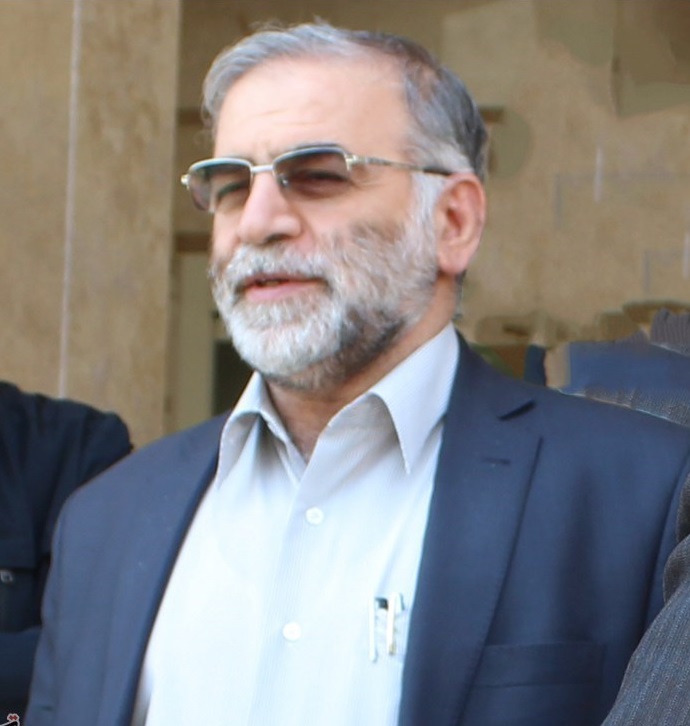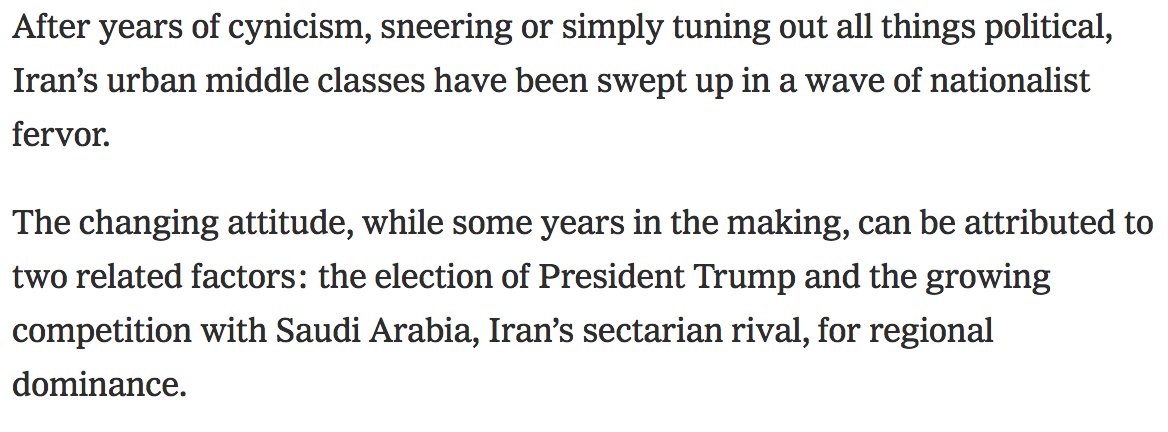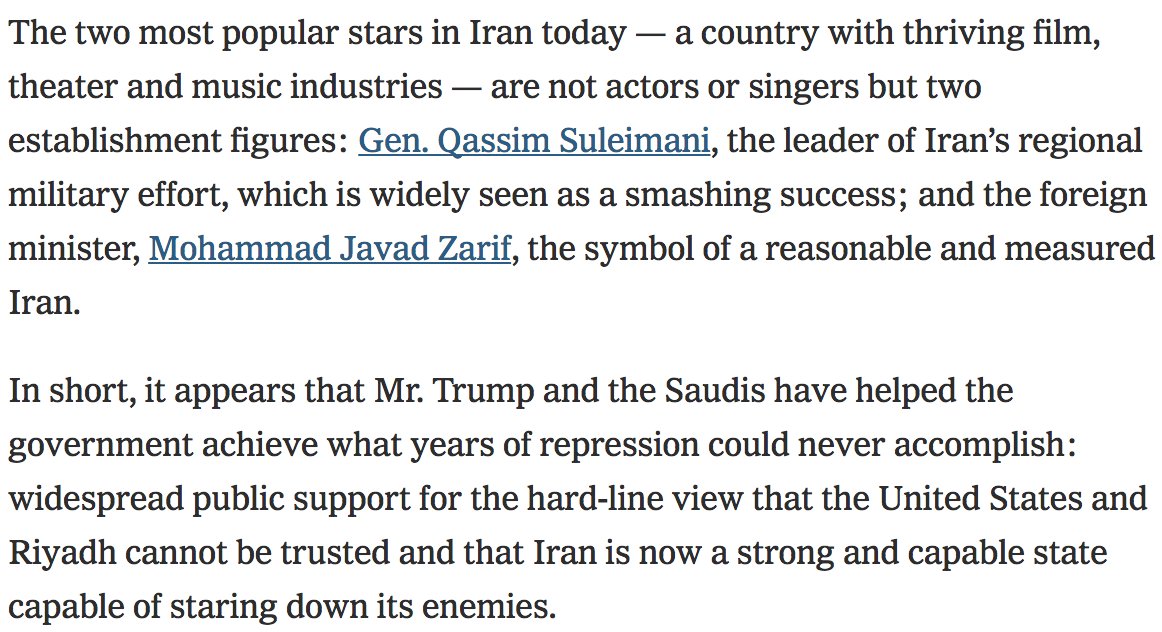
Now that the smoke has cleared somewhat, a few thoughts on the assassination of Mohsen #Fakhrizadeh:
1. What does it mean for Iran's nuclear program?
2. How will it affect future #JCPOA talks? And
3. How will it affect Iranian and regional politics? 1/
1. What does it mean for Iran's nuclear program?
2. How will it affect future #JCPOA talks? And
3. How will it affect Iranian and regional politics? 1/

What does it mean for Iran's nuclear program? #Fakhrizadeh is said to have headed the AMAD plan: Scientific and technological projects allegedly aimed to give the IRI the capability to build a nuclear explosive device. This murder represents both practical and symbolic blows. 2/
We don't have full clarity on #Fakhrizadeh's current work and if he was indeed retired as some claim. But practically, if the IRI wanted to restart its alleged weaponization effort, his loss denies it an enormous technical-managerial talent who could have overseen/advised it. 3/
It may also further dampen the IRI's ability to attract top-notch scientific talent to well-funded high-tech defense projects. Many already refuse to collaborate for ideological reasons or because of limitations this places on their lives. This reminds them of a third reason. 4/
#Fakhrizadeh's murder is also a huge symbolic blow: In the last decade the IRI has lost many military and scientific personnel of various statures in assassinations (from nuclear scientists to IRGC generals) with seemingly no consequences for the killers and their sponsors. 5/
But let's not exaggerate the consequences: Like the death of Tehrani Moghaddam and the missile program, or #Soleimani and the Sepah-e Ghods, any weaponization capability is institutionalized and will be retained, albeit at a lower level of efficiency in the short-term. 6/
Next, how will it affect future #JCPOA talks? While the IRI has committed to the rhetoric of "Maximum Resistance", underneath it has stuck to "Strategic Patience" amidst one assassination and sabotage operation after another. We may see some kind of revenge operation, but...7/
it's not clear to me the IRI can really successfully execute a proportional response (think of past unsuccessful assassination attempts against Israeli officials). And anyway it will want to keep its response below the threshold at which it could trigger a major conflagration. 8/
This could somewhat harden IRI's stance on the conditions for US re-entry into the #JCPOA under #Biden, including the "compensation" terms for #Trump's withdrawal. But I doubt this will be a big obstacle for initial US re-entry, which is a priority for all the P5+1 and Iran. 9/
But #Fakhrizadeh's killing, as part of the larger pattern of #Trump-era assassinations and sabotage aided and abetted by regional states, makes the conditions for the negotiation of a #JCPOA 2.0 or JCPOA+, which would presumably try to address regional security, tougher. 10/
Lastly, how could this affect Iranian/regional politics? #Fakhrizadeh's killing compounds serious questions about Iranian security force's capabilities and competence. Adversaries can seemingly kill key officials, steal top state secrets and sabotage vital facilities at will! 11/
All of us should envy the apparently unshakeable job security of senior Iranian intelligence and security officials, who in other systems might be put against the wall, thrown in jail, or at the very least thrown out of the job, but in the IRI keep their jobs or get promoted! 12/
Joking aside, the number of major IRI security-intelligence failures we've seen in Iran and abroad in the last decade is firstly a function of the sheer scale of efforts against it by an axis of states with some of the largest, most advanced and well-funded security forces. 13/
In this time and on its own soil, the IRI has become more adept at disrupting Western intel ops, foiling attacks by state-sponsored militant groups and taking dual-nationals and foreign guests hostage for ransom (often for funds legitimately owed to Iran) or prisoner-swaps. 14/
It's also shown itself adept at targeting adversaries' soldiers in combat zones, Diaspora oppositionists involved in violent attacks living in the West, and some adversaries' civilians abroad. But major capability gaps remain, leaving it vulnerable. 15/ bbc.co.uk/iplayer/episod…
In few instances that I'm aware has the IRI responded to major assassinations, sabotage, or open attacks on its assets and infrastructure (think of Israeli "campaign between wars" in the Levant) over the last decade to establish deterrence, leaving it open to future attacks. 16/
But history tells us the IRI often reflects on such failures and invests heavily to fill gaps: Iran's nuclear fuel cycle, ballistic missile, and cybersecurity programs, among others, that took decades to mature, were responses to past failures or capability gaps. 17/
Given current trends in Iranian politics, I can see at least three responses to security vulnerabilities. Further:
(a) Professionalization of security forces;
(b) Surveillance of society using latest tech (a la PRC); &
(c) Hardening of vulnerable borders (e.g. Caucuses) 18/
(a) Professionalization of security forces;
(b) Surveillance of society using latest tech (a la PRC); &
(c) Hardening of vulnerable borders (e.g. Caucuses) 18/
Many of these attacks are likely made possible by Iranian collaborators, so the harder question the IRI should probably be asking itself is why are so many supposed loyalist insider and ordinary people willing to betray the system and their country to foreign adversaries? 19/
Circling back to regional picture, while assassination-sabotage campaign over the last decade has taken a toll I'm not well-placed to measure, we have to ask if it's seriously deterred or scaled back the IRI's capabilities/efforts (except Syrian-Israeli front, where it has). 20/
I'm not convinced it has. If anything, the glaring impotence of the IRI to avenge the likes of #Soleimani or #Fakhrizadeh probably spurs IRI's security establishment to further harden Iranian territory against infiltration and enable it to retaliate to establish deterrence. 21/
(The one area I'm skeptical the IRI will be successful in bridging its capability gap in the long-term is deniable assassination or sabotage operations against hardened targets - individuals and facilities - on the territories of its two most ardent and advanced adversaries. 22/)
While I'm confident the IRI will continue investing in strategic capabilities and bridging the gap with its adversaries, I'm not ready to jump on the eternal "this will strengthen hardliners" bandwagon. Yes, it reinforces them under current system dynamics and 2021 elections. 23/
As the IRI prepares to select a new supreme leader and 2nd and 3rd gen leaders assume senior/mid-senior posts over the next decade, old principalist/reformist partisan lines are breaking down and many in the leadership are likely reflecting on the lessons of the last decade. 24/
How Iranian leaders process and respond to the experiences of the last decade - sanctions, wars, sabotage and assassinations that did massive damage to the country - remains to be seen. It may embolden a new generation of hardliners, but could lead others in new directions. 25/25
• • •
Missing some Tweet in this thread? You can try to
force a refresh





